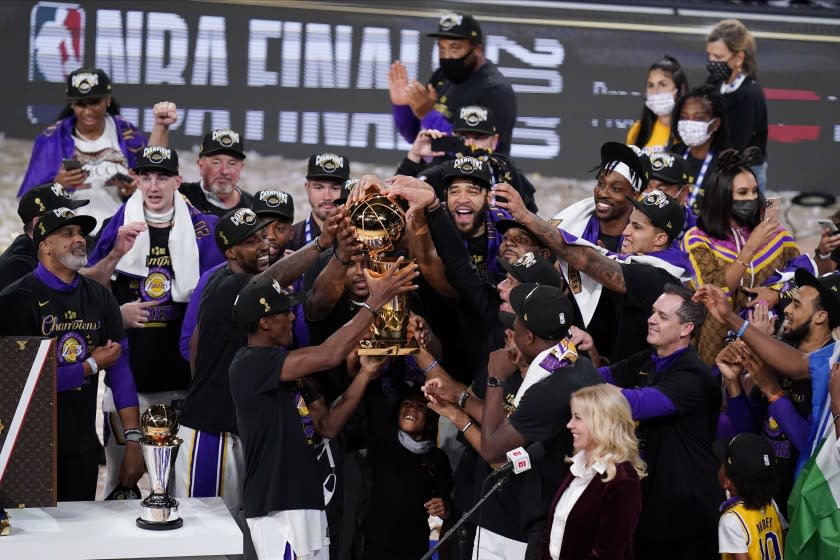Lakers and Dodgers championship bids are no boon for local business. Blame COVID-19.

In years past, a Lakers NBA championship run meant rabid fans arriving before and after games to crowd the lobby bar of the Hotel Figueroa, the 94-year-old inn a few blocks from the Lakers' home court, Staples Center.
The Lakers faithful would also gather around the poolside restaurant and two-story bar, ordering drinks and food and watching the games on flat-screen TVs.
"It’s been a lot quieter this year given the pandemic," Connie Wang, managing director of the Hotel Figueroa, said of the NBA season. She declined to disclose the financial impact.
While the Lakers won their 17th championship this month and the Los Angeles Dodgers are now battling for a World Series title this weekend, L.A. sports bars, merchandise stores, hotels and eateries are not benefiting from the typical fan gatherings — the drinking, eating and celebrating that come with such playoff runs.
Blame the COVID-19 pandemic, which forced the NBA playoffs to be held in a "bubble" at the Walt Disney World campus and pushed the World Series to the Globe Life Field in Arlington, Texas. The virus has also squashed most watch parties at sports bars and killed all championship parades.
Although economists who study the matter question how much championships generate for the local economy, managers and owners of businesses that have benefited from L.A.'s professional sports franchises estimate that business is off this year at least 50% compared with pre-pandemic years.
The 178-room Luxe City Center Hotel, across the street from Staples Center, is currently taking in only guests who are struggling with financial hardship because of the pandemic, said Luxe Hotel President Aaron Harkham. During past playoff runs, he said, the hotel would be "crowded and buzzing with excitement at the hotel restaurant."
The Dodgers Clubhouse, a sports merchandise store in the Montebello Shopping Center, has had a steady stream of customers since the "Boys in Blue" started their latest title run, said assistant manager Melissa Orozco.
"Anything that says 'World Series' is selling out," she said.
But in years past when the Dodgers battled for a title at Chavez Ravine, Orozco said, the store would be "a lot crazier."
Still, some sports economists say the City of Angels may not be missing out on that much spending this year, especially after costs are factored in.
The spending sparked by professional sports playoffs and championships is negligible because most of it is done by local fans who might buy a couple of beers, hot dogs and a jersey without spending much more than they would normally shell out on day-to-day expenses, according to researchers who study sports-related consumption.
"When you do the statistical analysis, the economic impact doesn't measure something appreciable more than zero," said Robert Baade, an economics professor at Illinois' Lake Forest College, who has been studying sports economics for about 30 years. He coauthored a study in 2003 that said sports championships are "the gift that keeps on taking."
He points out that championship runs don't draw many out-of-town visitors, who typically spend more heavily on upscale hotels, rental cars and fine dining.
Nola Agha, an associate professor who specializes in sports financing and economics at the University of San Francisco, agrees: Even if fans buy jerseys and flags to support their team during a championship run, it's likely those same fans would have otherwise spent the same amount locally on other things, such as clothes and food.
"It's not really a big shift," he said of the spending.
Baade and Agha also point out that championship celebrations typically cost the hosting city millions of dollars for crowd and traffic control and street cleanup afterward. And if the celebration gets out of hand, the damage to local businesses and public property can get pricey, they note.
"If you have a parade, that's a whole other expense," Agha said.
Such assessments are not shared by the Los Angeles Sports Council, a nonprofit group that promotes Los Angeles' professional and collegiate sports teams.
The group estimates that in 2018, the sports industry in Los Angeles generated $6.2 billion in economic output, supporting nearly 40,000 jobs and creating $327 million in state and local taxes.
In a statement, the council said the pandemic has cut into the spending that would normally be generated at the arena and ballpark and throughout the region if the Lakers and Dodgers were playing this year in Los Angeles.
"Significant economic impact has also been felt by local businesses, especially sports bars and restaurants as they traditionally see a surge in business during a local team's championship run," the group said.
This story originally appeared in Los Angeles Times.

